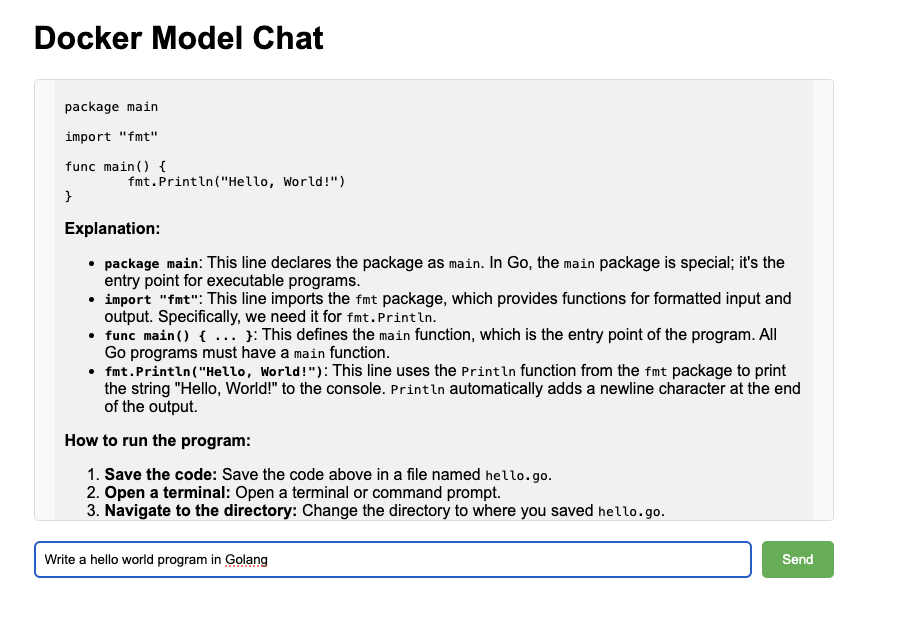Run AI models with Docker Model Runner
Introduction
Run AI models using Docker Model Runner
Run a containerized AI chat app with Docker Compose
Next Steps
Run AI models with Docker Model Runner
Docker Compose makes it easy to run multi-container applications, and it can also include those that include local AI inference services.
In this section, you’ll use Docker Compose to deploy a simple web-based AI chat application. The frontend is a Flask web app, and the backend uses Docker Model Runner to serve AI responses.
Clone the example project
Clone the docker-model-runner-chat repository from GitHub. This project provides a simple web interface to interact with local AI models such as Llama 3.2 or Gemma 3.
git clone https://github.com/jasonrandrews/docker-model-runner-chat.git
cd docker-model-runner-chat
Review the Docker Compose file
The compose.yaml file defines defines how Docker Compose sets up and connects the services.
It sets up two services:
- ai-chat: A Flask-based web application that provides the chat user interface. It is built from the local directory, exposes port 5000 for browser access, mounts the project directory as a volume for live code updates, loads environment variables from
vars.env, and waits for theai-runnerservice to be ready before starting. - ai-runner: This service uses the Docker Model Runner provider to run the selected AI model (for example,
ai/gemma3). The configuration underprovidertells Docker to use the model runner extension and specifies which model to load.
The setup allows the web app to communicate with the model runner service as if it were an OpenAI-compatible API, making it easy to swap models or update endpoints by changing environment variables or compose options.
Review the compose.yaml file to see the two services.
services:
ai-chat:
build:
context: .
ports:
- "5000:5000"
volumes:
- ./:/app
env_file:
- vars.env
depends_on:
- ai-runner
ai-runner:
provider:
type: model
options:
model: ai/gemma3
Start the application
From the project directory, start the app with:
docker compose up --build
Docker Compose builds the web app image and starts both services.
Access the chat interface
Once running, open your browser and copy-and-paste the local URL below:
http://localhost:5000
You’ll see a simple chat UI. Enter a prompt and get real-time responses from the AI model.
 Docker Model Chat
Docker Model Chat
Configure the model
You can change the AI model or endpoint by editing the vars.env file before starting the containers. The file contains environment variables used by the web application:
BASE_URL: The base URL for the AI model API. By default, it is set tohttp://model-runner.docker.internal/engines/v1/, which allows the web app to communicate with the Docker Model Runner service. This is the default endpoint setup by Docker to access the model.MODEL: The AI model to use (for example,ai/gemma3orai/llama3.2).
The vars.env file is shown below.
BASE_URL=http://model-runner.docker.internal/engines/v1/
MODEL=ai/gemma3
To use a different model or API endpoint, change the MODEL value. For example:
MODEL=ai/llama3.2
Be sure to also update the model name in the compose.yaml under the ai-runner service.
Optional: customize generation parameters
You can edit app.py to adjust parameters such as:
temperature: controls randomness (higher is more creative)max_tokens: controls the length of responses
Stop the application
To stop the services, press Ctrl+C in the terminal.
You can also run the command below in another terminal to stop the services.
docker compose down
Troubleshooting
Use the steps below if you have any issues running the application:
- Ensure Docker and Docker Compose are installed and running
- Make sure port 5000 is not in use by another application
- Check logs with:
docker compose logs
What you’ve learned
In this section, you learned how to use Docker Compose to run a containerized AI chat application with a web interface and local model inference from Docker Model Runner.